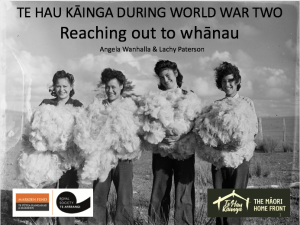3 Summer Scholarships for Māori students
The Te Hau Kāinga team are looking for three Māori students (second year or higher in 2019) for some amazing research-based work over the 2019-2020 summer break. There are two main options. One is to develop a project in your home area to look at how the Second World War affected the whānau and communities there. The output can be a written report, a mōteatea, a video (or something else) that can be shared with your whānau. The other is to undertake archival research within an archive, such as the Hocken Collections, or Ngā Taonga Sound and Vision. If you are curious, or want to discuss an idea, or find out more, contact the project leaders. Click here for more information, or to apply.
Website now live for Te Hau Kāinga project
 The website for the Te Hau Kāinga project went live this week. Te Hau Kāinga is a Marsden-funded research project led by Angela Wanhalla (History) and Lachy Paterson (Te Tumu) investigating the impacts of World War Two on Māori who remained in New Zealand during the conflict, either in their home communities, or working away from home. Designed by local web design company, Myth, the website is fully bilingual. It features a photo gallery, and a “stories” section, as well as a page where interested people can upload their own whānau stories and photographs. Check it out – click here. As stories get added to this site, links to these will be posted to the project’s FaceBook and Twitter pages. Feel free to follow these to find out more as the project rolls out.
The website for the Te Hau Kāinga project went live this week. Te Hau Kāinga is a Marsden-funded research project led by Angela Wanhalla (History) and Lachy Paterson (Te Tumu) investigating the impacts of World War Two on Māori who remained in New Zealand during the conflict, either in their home communities, or working away from home. Designed by local web design company, Myth, the website is fully bilingual. It features a photo gallery, and a “stories” section, as well as a page where interested people can upload their own whānau stories and photographs. Check it out – click here. As stories get added to this site, links to these will be posted to the project’s FaceBook and Twitter pages. Feel free to follow these to find out more as the project rolls out.
Te Hau Kāinga
 Angela Wanhalla (History) and Lachy Paterson (Te Tumu) will be giving a talk on what’s involved in their new Marsden-funded project, Te Hau Kāinga: Histories and Legacies of the Māori Home Front, 1939-1945 this evening.
Angela Wanhalla (History) and Lachy Paterson (Te Tumu) will be giving a talk on what’s involved in their new Marsden-funded project, Te Hau Kāinga: Histories and Legacies of the Māori Home Front, 1939-1945 this evening.
This will be in the Seminar Room at the Hocken Collections at 5.30pm, 11 September. Yes – this evening.
In particular, they will be explaining how they intend to reach out to whānau to let them know about the project, and to give them the opportunity to share stories of how their kaumātua or tīpuna coped during the war period. Students who wish to return home and undertake some whānau research over the summer break should come along and learn about the summer scholarships on offer. Another highlight will be a sneak preview of the project’s website that will be launched very soon.

